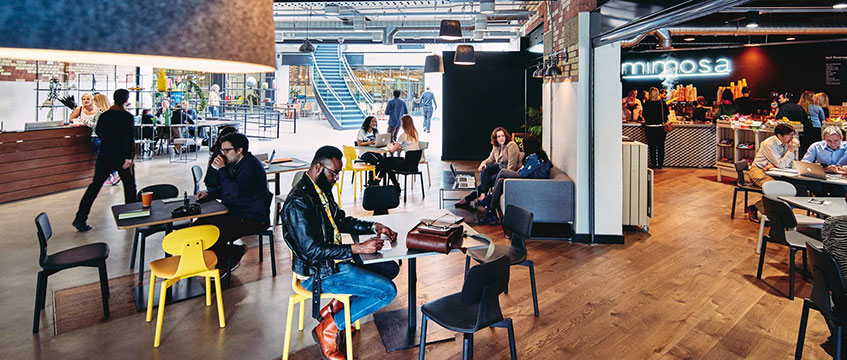Workspace boss eyes flex competition from London landlords
London landlords could pose a threat to the growth of flexible office space providers if they double down on their offerings and move away from being “obsessed by NAV”.
Workspace chief executive Graham Clemett said the capital’s landlords could be “the biggest competition” that businesses such as his face if they work on building their own flex platforms and undergo a change of mindset.
Traditional property companies are eyeing up the flex office space sector as an attractive opportunity to tap into post-Covid-19. Legal & General, for example, is looking to double its amount of flexible offerings by the end of the year, saying coronavirus has helped to “speed up” the development of its Capsule brand.
London landlords could pose a threat to the growth of flexible office space providers if they double down on their offerings and move away from being “obsessed by NAV”.
Workspace chief executive Graham Clemett said the capital’s landlords could be “the biggest competition” that businesses such as his face if they work on building their own flex platforms and undergo a change of mindset.
Traditional property companies are eyeing up the flex office space sector as an attractive opportunity to tap into post-Covid-19. Legal & General, for example, is looking to double its amount of flexible offerings by the end of the year, saying coronavirus has helped to “speed up” the development of its Capsule brand.
Meanwhile, although CBRE has halved the expansion of its flex office space business, Hana, for the rest of the year, president and chief executive Bob Sulentic remained bullish on the longer-term opportunities in a post-coronavirus world. The agent is in talks with landlords that want to “control flex space in their own buildings”.
Clemett said this could pose competition for flex space providers. “We’ve always said the people that would potentially be the biggest competition would be other London landlords,” he said. “But the difference is [they operate on] a fundamentally different model – they are generally traders and developers, and not long-term holders of their assets.”
He added: “There are a lot of skills and expertise in this business built up over the years. I think you have to build up a platform and culturally move away from being obsessed by NAV and be much more focused on driving income.”
During the three months to the end of June, Workspace has lost out on roughly £15m of revenue after offering three-quarters of its customers a 50% rent reduction. Workspace’s share price fell on Friday 5 June, the day the latest results were announced, but has recovered in early trading this week.
Clemett said the company is yet to decide whether it will offer ongoing rent reductions to tenants. “It’s £15m of rent we’ve effectively given back to those customers,” he said. “I see it as an investment in the future, goodwill and the future growth of those businesses. I’m comfortable with what we did. I think it’s the right thing to do, to share the burden with them.”
Chief financial officer Dave Benson said most Workspace customers have paid their rent but the company is still in discussions with a “smaller number of large businesses in the most impacted sectors”.
“Conversations are ongoing, and obviously as the lockdown eases and they have to ascertain where they are and understand their needs a bit better, we expect those conversations to progress,” Benson added.
Clemett said Workspace has found the greatest challenge is gathering rent from companies providing retail and food and beverage offerings in Workspace’s buildings, as opposed to the small and medium-sized businesses that pay for workspace.
“The people who we generally have problems with are the larger, more corporate businesses,” he said. “On the ground floor of our buildings we typically have restaurants, cafés and retailers, and those are the sorts of people who are not paying.”
Pre-Covid-19, Clemett said the flex space operator would usually receive around 1,000 enquiries a month, 100-120 of which would lead to a deal being struck. But in April, no deals were agreed.
However, he insists that business is now picking up. Workspace received 500 enquiries in May, and this month 35% of enquiries have led to a viewing.
To send feedback, e-mail lucy.alderson@egi.co.uk or tweet @LucyAJourno or @estatesgazette











